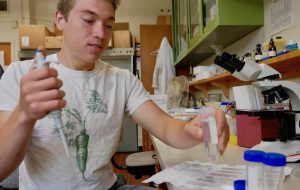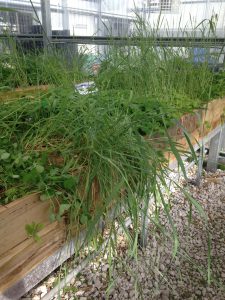Ethan Weinrich has packed a lot of experiences into his time at the University of Florida. As a community college transfer student from Tallahassee, it seems that was the only option for his two years in Gainesville. Ethan is graduating with a Bachelor of Science degree in Interdisciplinary Studies with a concentration in Environmental Management in Agriculture and Natural Resources through the Soil and Water Sciences Department. His resume includes an undergraduate research project, an on-campus internship, volunteer work, and membership in a student club. Ethan even knows what he is doing after graduation.
Coming to UF
After Ethan earned his Associate in Arts degree, he was ready for UF and enrolled for the Fall 2017 semester. He wanted to study sustainable agriculture and chose the Environmental Management program because he thought it was a good fit.
“At the time I was looking for broad systems,” he said. “You know, start broad and then narrow it down as you learn more.”
Ethan already had some ideas of what he wanted to learn. While working at a small organic farm near Tallahassee, his boss introduced him to mycorrhizal fungi, specifically its role in plant growth.
“I’m interested in mycorrhizae just as a proxy for soil health, and how microorganisms are able to thrive in agriculture,” he said. “That hasn’t been a focus in contemporary, large-scale agriculture.”
Ethan wanted to learn more about mycology but said he could not find the right classes. He decided to pursue it on his own, at his own pace, by conducting his own research project.
University Scholars Program

The same year Ethan arrived, Dr. Masanori Fujimoto began working as a research assistant professor in the Soil and Water Sciences Department. He was setting up his research program and sent out an email looking for undergraduates to work in his lab. Ethan thought this would be a good opportunity and applied.
“I was looking for a position where I could start doing someone else’s research – learning some lab or field-based processes – and maybe getting paid,” Ethan recalls, but that is not how it worked out. “He really encouraged us to look for what we’re interested in doing.”
“I just wanted to help him to reach his goal,” Dr. Fujimoto said. “Align what he is doing now with what he is going to do in the future.”
He encouraged Ethan to develop a research proposal he is passionate about and to look into the University Scholars Program (USP), which includes a $1,750 stipend. Selected students conduct a full research project, under the guidance of a faculty member. Ethan developed a proposal to study the cover crop effect on mycorrhizae abundance and diversity in an agricultural setting. His project was accepted and funded by USP for the 2018-2019 academic year and Dr. Fujimoto became his faculty mentor.
Research Project
Both cover crop and mycorrhizal fungi are utilized in sustainable agriculture and are transferable across the globe including those countries where sustainable food production is challenging.
“I was hoping to get information that could inform management decisions for farmers,” Ethan explains.


The research was conducted in a greenhouse on campus to protect the plants from severe weather. Rye, clover, and Seminole pumpkin were planted in separate boxes and one had a mixture of all three. The results show cover crops had a positive effect on mycorrhizae abundance compared to the control. However, Ethan says the mixture of plants had no significant additive effect on mycorrhizal abundance compared to a homogeneous plant plot, which leads to further investigation.
“It could be antagonism between plants or mycorrhizal species because they’re all trying to compete to colonize at the same time,” he hypothesized. “Maybe the plants were benefiting each other, so they did not initiate the need for mycorrhizae.”
Ethan presented his findings at the Undergraduate Research Symposium. Ethan is also working with Dr. Fujimoto to get the work published in a peer-reviewed journal after DNA sequencing-based mycorrhizal diversity analysis is completed.
“I try to help as much as I can,” Dr. Fujimoto said. “I told (my lab students), I’m going to teach you how to do research, how to design a study, collect the data, process data, statistical analysis, making figures, communicating with people. That’s what it takes to do research, to complete research.”
In the field
Outside the classroom and the lab, Ethan was involved in the Organic and Sustainable Agriculture Club. Part of the Club’s service was to work in the Field and Fork garden.
“We were doing whatever farm tasks were left over at the end of the day,” Ethan said. “I like the slow pace of just enjoying the space and enjoying learning about food production and sustainable agriculture and agroecology.”
The experience also gave him the chance to put into practice the lessons learned from his coursework and research.
“I’m able to really think about why these things are happening,” he explained. “Really make connections when you’re involved in something like that and solidify them a lot more efficiently also.”
The volunteer work led to Ethan earning an internship with the Field and Fork program.
“It really is fun, and I’ve worked with a lot of great people out there too. I’m really going to miss the Field and Fork program.”
After Graduation
Ethan is not facing the question of “what will I do after graduation?”. The Peace Corps accepted him, and he signed up for two years of volunteer service.
“I’m shipping out to Senegal in September,” Ethan said. “I figure they know what programs are going on, they know where I would be the best suited.”
His position title is “sustainable agriculture specialist.” The Peace Corps website lists job duties as “assist(ing) smallholder farmers and their family members to adopt improved crop cultivation technologies and practices, particularly conservation agriculture, home gardening, improved soil and water conservation, improved post-harvest management, and better farm management.”
“I love working out in the field, but my goals are to learn about how to address food insecurity primarily,” Ethan said.
Dr. Fujimoto knows Ethan’s experience in farming and what he has learned as an undergraduate will serve him well in Western Africa.
“He knows the Peace Corps is also a learning opportunity,” Dr. Fujimoto said. “He’s willing to learn a lot about their local way of doing it.”
Ethan is learning to speak French between now and his three months of training in Senegal. After that, he will have two years to show his adoptive community all he has learned at UF and help it build a more sustainable agricultural system.
 0
0
